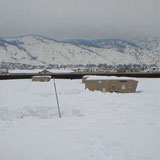2000 was a good year for proponents of immigration reform. The elections of President George W. Bush and his Mexican counterpart Vicente Fox signaled a new chapter in U.S.-Mexico relations. The Bush administration initially saw great benefit to establishing a guest worker program for the agricultural sector and flirted with the idea of granting amnesty to millions of Mexicans unlawfully residing in the United States. In August 2001, the countries reached a preliminary agreement addressing these issues.
But the events of Sept. 11 rocked the political landscape, relegating the Bush administration's initial plans to craft a more open relationship with Latin America to the back burner. As concerns about homeland security and counterterrorism justifiably leapt to the top of the national agenda, comprehensive immigration reform became one of the first casualties. Opponents of immigration reform used Sept. 11 to assert that immigration and security are mutually exclusive goals, and congressional opponents of immigration gained stronger visibility.
After two years of inactivity on the topic, Congress suddenly has embraced immigration reform with renewed vigor. It's not difficult to see why congressional interest has returned. There currently are an estimated 8 million unauthorized immigrants in the United States, including 5 million to 6 million who are believed to have arrived in the 1990s but about whom authorities know little.
In July, Reps. Jim Kolbe (R-Ariz.) and Jeff Flake (R-Ariz.) introduced the Border Security and Immigration Improvement Act (HR 2899), which aims to address projected labor shortages by establishing two new visa categories—one for foreign workers living outside the United States and the other for undocumented foreign workers living in the United States.
Kolbe says the legislation represents "a practical and progressive way to deal with the many problems associated with illegal border crossings and the need to find workers to fill positions no domestic worker is willing to take."
Sen. John Cornyn (R-Texas) also introduced legislation in July, the Border Security and Immigration Reform Act of 2003 (S 1387). Cornyn's bill would amend the Immigration and Nationality Act to direct the secretaries of homeland security and state to jointly establish a seasonal and nonseasonal guest worker program with an eligible foreign country. The bill also would give permanent resident status to guest workers who have participated in the program for at least three years.
Rep. Dick Gephardt (D-Mo.) recently introduced a bill that would grant permanent resident status to certain workers. And as of October, Sen. Edward Kennedy (D-Mass.) was putting the final touches on a wide-reaching immigration reform measure. All these bills have drawn a wide array of support and criticism, and none currently are bipartisan. The bills are viewed as launching points for more dialogue.
Efforts to coerce countries of origin to stem the flow of migrants, employer sanctions and stricter border-control mechanisms have failed. The predicament facing the United States is that its ability to control immigration has withered as its enthusiasm for doing so simultaneously has grown. The United States maintains a rigid patchwork of laws and mounts extensive unilateral law enforcement efforts but has lost control of its borders. Even if it devises a means to significantly curtail immigration, its economy would suffer.
Foreign workers were vital to U.S. economic growth during the past decade and will be irreplaceable during the next decades as the United States faces demographic and societal trends that ensure it will not have the number of workers needed to meet the level of economic growth demanded. NRCA members, in particular, face an enduring shortage of workers. The U.S. Bureau of Labor Statistics projects that 50,000 workers will be needed in the roofing industry during the next decade to keep pace with the demand for roofing services.
Opponents of immigration would have the United States enact a moratorium on new arrivals, station troops along its borders or expel the millions of undocumented foreigners in the country. But what is called for is an immigration system that recognizes the ongoing need of the U.S. economy for foreign workers and assists in separating those who wish to destroy America from those who wish to help build it.
Allowing essential workers to legally enter the United States using simplified, realistic documentation procedures would provide concrete action toward the goal of safeguarding the United States' economic future. Such reform will strengthen the nation's security. By not tackling the problem of illegal immigration, the United States will continue to be vulnerable to those who want to harm it. NRCA is urging Congress to fix an immigration system that serves neither America's economic security nor national security needs.
R. Craig Silvertooth is NRCA's director of federal affairs.

